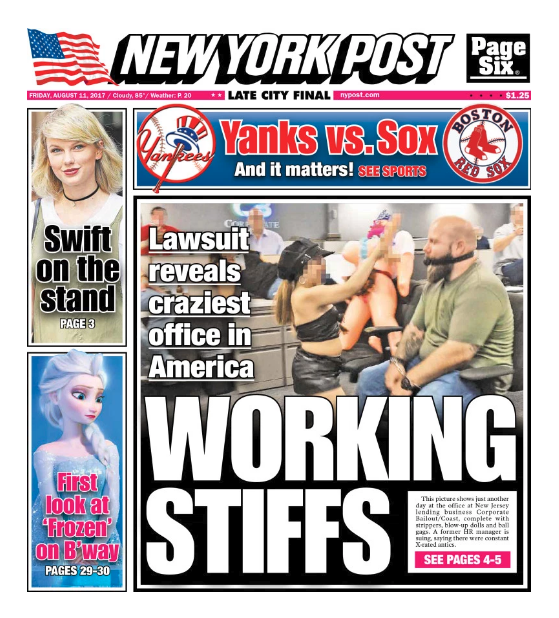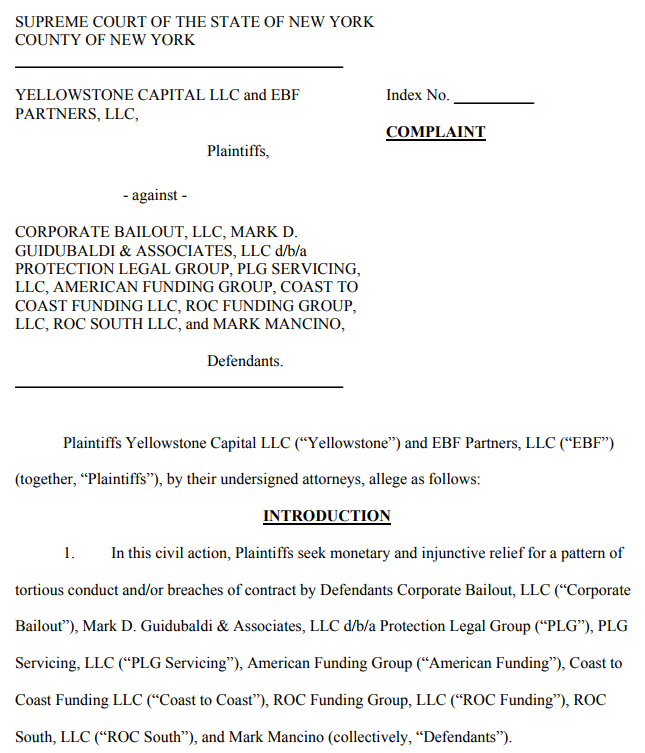Archive for 2017
ISOs Alleged to Be Partners in Debt Settlement “Scam” in Explosive Lawsuit
September 28, 2017 ISOs and brokers referring deals to debt settlement companies should pay attention to a lawsuit that was filed in the New York Supreme Court on Wednesday. In it, plaintiffs Yellowstone Capital and EBF Partners (“Everest Business Funding”) allege that certain ISOs are culpable partners in a scam that nefarious debt settlement companies are perpetrating on small businesses.
ISOs and brokers referring deals to debt settlement companies should pay attention to a lawsuit that was filed in the New York Supreme Court on Wednesday. In it, plaintiffs Yellowstone Capital and EBF Partners (“Everest Business Funding”) allege that certain ISOs are culpable partners in a scam that nefarious debt settlement companies are perpetrating on small businesses.
The debt settlement companies “mislead the merchants as to the services they will perform and the cost to the merchant, and they also conceal their relationships with the ISO Defendants and the fact that they or their affiliates are introducing these same merchants to merchant cash advance providers like Plaintiffs only to later induce those merchants to breach their agreements with their cash advance providers,” the complaint states.
Among the named defendants are:
- Corporate Bailout, LLC
- Mark D. Guidubaldi & Associates, LLC dba Protection Legal Group
- PLG Servicing LLC
- American Funding Group
- Coast to Coast Funding, LLC
- ROC South, LLC
- Mark Mancino
Several defendants are already best known for running an office “so sexually aggressive, morally repulsive, and unlawfully hostile that it is rivaled only by the businesses portrayed in the films ‘Boiler Room’ and ‘The Wolf of Wall Street,’” according to a salacious story that graced the back cover of the New York Post last month.
One paragraph of the complaint summarizes the allegedly collaborative scheme like this:
American Funding, Coast to Coast, […] (the “ISO Defendants”) are independent sales organizations (“ISOs”), companies that ostensibly support the merchant cash advance industry by brokering merchant agreements for companies like Plaintiffs. The ISO Defendants are anything but the proverbial “honest brokers.” As alleged below, they have partnered with companies that purport to offer debt relief services to merchants who have agreements with merchant cash advance companies like Plaintiffs. In practice, for these companies, “debt relief” is a code word for deceiving merchants to breach their existing agreements with Plaintiffs and to instead pay fees to these debt relief entities. In short, they scam merchants into believing that they can save them money when, in fact, they leave these merchants in financial shambles, while causing Plaintiffs to suffer millions of dollars in losses and future los[t] profits.
“’DEBT RELIEF’ IS A CODE WORD FOR DECEIVING MERCHANTS TO BREACH THEIR EXISTING AGREEMENTS”

Central to the plaintiffs’ claim is that they have ISO agreements with the defendants and that the defendants’ conduct is a breach of those agreements. The three causes of action alleged are tortious interference with contract, conversion, and breach of contract. Plaintiffs claim that 100 merchants with more than $3 million in outstanding balances are in breach of their contracts because of the defendants’ conduct.
The complaint was prepared and filed by attorneys at Proskauer, a 142-year old law firm founded in New York City.
Debt Relief Under Fire
The small business debt relief industry has been marred by scandal in recent years. In an unrelated criminal matter being handled in the Western District of New York, the owner of Corporate Restructure Inc. (no ties to Corporate Bailout) is currently residing in the Niagara County Jail awaiting trial on charges of conspiracy to commit mail fraud, wire fraud, bank fraud and money laundering for failing to deliver the debt relief services it charged for. In that case, United States vs. Sergiy Bezrukov, Bezrukov advertised that he could reduce a merchant’s short term debt by up to 75%. He is facing up to 30 years in prison. He was also previously a merchant cash advance ISO.
Two other MCA funding companies, Pearl Gamma Funding and Pearl Beta Funding, filed a lawsuit last November against another debt relief company that calls itself Creditors Relief. The complaint in that case also alleges tortious interference with contract and is still pending.
Meanwhile, a lawsuit filed in May by famous TCPA litigant Craig Cunningham against Corporate Bailout and Mark D Guidubaldi & Associates LLC went unanswered, according to court records. Cunningham, who alleged violations of telemarketing laws, filed for a default judgment against Corporate Bailout on September 12th.
Taking Advantage
Both Yellowstone Capital and Everest would not comment on the lawsuit they filed, citing pending litigation. Sources close to them, however, contend that both companies take matters that involve merchants being taken advantage of very seriously.
“When our own ISOs work directly in concert with companies that induce merchants to breach our contracts, that’s a problem,” said one source who did not wish to be named and was speaking generally about the recent introduction of debt relief service companies to the industry. “They’re taking advantage of businesses that can’t afford to be taken advantage of.”
An email sent by deBanked to Mark Mancino early Thursday afternoon, an individually-named defendant alleged to be affiliated with the other defendants, has not yet received a response. This story may be updated if a reply is received.
A COPY OF THE COMPLAINT CAN BE VIEWED HERE.

Scott Cornelis Joins Enova International as Treasurer
September 28, 2017Scott Cornelis, the head of capital markets at BorrowersFirst, has become the Treasurer at Enova International, according to LinkedIn.
BorrowersFirst is an online consumer lender that raised a $100 million senior debt commitment from Waterfall Asset Management earlier this year.
Enova is a publicly traded online lending company that owns The Business Backer and Headway Capital.
Prior to BorrowersFirst, Cornelis was an executive director at JPMorgan’s investment bank.
Ranger Direct Lending Fund Cites Princeton Fund As Source of Woes
September 27, 2017Ranger Direct Lending (Ranger), A UK-listed fund that has invested with companies such as AmeriMerchant/Capify, Biz2Credit, and Blue Bridge Financial, cited problems with the Princeton Alternative Income fund in its latest midterm report. The problems stem from Princeton’s original investment in Argon Credit, an online consumer lender that went bankrupt last December. The judge in the bankruptcy proceeding found that several of Argon’s asset valuation claims were unrealistic when Princeton attempted to secure its collateral. After a settlement, Princeton gained control of Argon’s loans and is servicing them. Meanwhile, Ranger sought to determine the damage that Argon had caused Princeton and was not satisfied with the answers it got, according to reports.
Princeton’s alleged lack of transparency caused Ranger to initiate arbitration proceedings against Princeton this past June. A hearing on the matter is scheduled to take place in November.
Ranger’s Net Asset Value grew by more than 4% in the first six months of the year, yet its share price has fallen to a substantial discount.
“The lack of clarity surrounding this [Argon Credit] impairment and the unwillingness of Princeton to supply detailed information to the Company or Deloitte, the Company’s auditors, led to the qualification of Ranger’s 2016 year-end audit opinion and only served to add to investor uncertainty,” a Ranger report says.
As of June 30, 2017, Ranger reportedly had more than $50 million invested in merchant cash advances and business loans, about 18% of its portfolio.
Funders and Lenders are Relying More on Brokers, Survey Finds
September 27, 2017Business lending and MCA CEOs are not finding it easy to reduce their dependence on brokers, the latest Bryant Park Capital/deBanked survey results suggest. In a past survey conducted in Q4 2015, respondents indicated that an average of 46% of their business came from external sources/ISOs versus internal marketing. 44% of respondents also reported at the time that they expected the percentage of ISO business to decrease while 33% expected it would remain the same.
Nearly two years later, respondents to the latest survey reported that an average of 64% of their business now comes from ISOs/external sources, a significant increase. 62% of those surveyed said they expected that percentage to decrease.
OnDeck, who did not participate in the survey, reported last quarter that 21.1% of their loans were originated through ISOs, brokers and related parties, up from its lowest point in recent years. That accounted for 24.3% of the total dollars loaned for the period.
Confidence in MCA and Online SMB Lending Industry Ticks Up
September 26, 2017The latest industry CEO survey conducted by Bryant Park Capital and deBanked showed that confidence in the continued success of the SMB lending/MCA industry is coming back. Confidence had a hit a low of 73.8% in Q1 of this year, the lowest point since the survey started in 2015. In Q3, the number jumped up to 81.3%.
Confidence in being able to access capital at a reasonable cost to grow ticked up only slightly to 79.9%, up from its lowest point in Q1 this year at 78.7%.
The first quarter of 2016 holds the confidence record since the surveying began. Coincidentally, that period is widely considered to be the peak of the online lending bubble. An April 2016 blog post published during that year’s annual LendIt Conference declared an end to the euphoria.
While respondents to the most recent survey were not asked to explain their confidence level, factors like a steady regulatory climate and some recent competition-reducing consolidation likely played a role in the boost.
How LendingTree and SnapCap Crossed Paths
September 25, 2017 LendingTree in recent days revealed the acquisition of online platform for small business lending SnapCap’s non-lending assets in a $21 million deal, including $12 million upfront and $9 million in contingency payments. The deal gives online lending marketplace LendingTree more scale in the small business market ahead of what could shape up to be recovery in 2018.
LendingTree in recent days revealed the acquisition of online platform for small business lending SnapCap’s non-lending assets in a $21 million deal, including $12 million upfront and $9 million in contingency payments. The deal gives online lending marketplace LendingTree more scale in the small business market ahead of what could shape up to be recovery in 2018.
J.D. Moriarty, LendingTree Chief Financial Officer, told deBanked that SnapCap’s 20 employees will stay in Charleston, and the brand will remain intact. “For them, their employer just got both a whole lot more stable and scalable. As with anything we acquire, we will keep the brand in place and test it to see what is most effective,” said Moriarty.
LendingTree has been connecting small businesses with lenders since 2014, and the latest deal reflects a strategy to add scale.
“It’s a bit of what you might call an acqui-hire. LendingTree is growing quickly and scaling. We hired a really good team in SnapCap that will basically be our way of scaling in small business,” said Moriarty.
LendingTree is lifting its profile in the small business segment amid an industry transformation that is thinning the pack and has seen some players shifting gears entirely.
“Small business lending might do very well in 2018. And we are investing now to grow the base of our business. On a macro level, we expect our business to do well in 2018 regardless. But if small business lending recovers and suddenly you see companies like OnDeck doing well, we will benefit from that. But we position any acquisition assuming that the market doesn’t recover and the deal still must be attractive to us, even if the market continues to struggle.”
Moriarty went on to provide a glimpse into the financial structure of the deal.
“Last year, SnapCap set up a special purpose vehicle (SPV), which was funded by outside capital with which they would actually make loans. There’s a balance sheet aspect to that business we are not acquiring. But it was a small percentage of their business,” Moriarty explained.
Inside the Marketplace
LendingTree is largely known as a marketplace for mortgage loans where they represent about 50 percent of comparison shopping for mortgages. “That is how people think of us for sure,” said Moriarty. The revenue drivers have expanded in recent years, however.
For instance, mortgages used to account for 90 percent of revenue. Today, based on the most recent quarter, less than half of business originates from mortgages while the balance is in personal loans, credit cards, home equity, small business and auto loans.
LendingTree is no stranger to acquisitions, having done five such deals since June 2016. “What we’re trying to do is to build other marketplaces where people want to comparison shop,” said Moriarty.
But growth by acquisition is not their only growth strategy. “We’re growing period,” said Moriarty, adding that organic growth has been very good but small business in particular is a tough market to scale.
One of the recent deals, the acquisition of CompareCards a year ago, led them to gain market share in the credit card space. That deal also led LendingTree to SnapCap. CompareCards founder and president Chris Mettler and his wife own more than a one-third equity stake in SnapCap.
“SnapCap was introduced to us through Chris. He’s now a LendingTree employee. The introduction was absolutely from him. But it’s very consistent with our strategy, which we have conveyed to the market. We will continue to make small, accretive acquisitions and that will help us to gain scale in certain businesses and diversify,” said Moriarty.
Hybrid Model
While LendingTree and SnapCap both facilitate loans to the small business community, they take slightly different approaches to get there. “SnapCap’s core business is not unlike ours, meaning they are essentially finding high quality leads for lenders,” said Moriarty.
SnapCap uses a concierge model in which customers have a broker experience. They talk to someone at the company who helps them to identify a lender.
“LendingTree will be bigger and more scalable through both the traditional LendingTree model and SnapCap’s concierge approach. We will simply be able to serve lenders more effectively. If I’m a lender making small business loans, this is a pretty good thing.” he said.
SnapCap, meanwhile, is looking forward to the very same scale that LendingTree is targeting.
“The mission of SnapCap has always been to serve small business owners with access to funding. LendingTree’s leading online lending marketplace combined with SnapCap’s successful concierge model will enable us to serve an even wider range of business owners,” Hunter Stunzi, co-founder of SnapCap, told deBanked.
Bizfi Survives, Thanks to World Business Lenders Asset Purchase Deal
September 22, 2017 The Bizfi marketplace is slated to live on, according to Stephen Sheinbaum who joined World Business Lenders (WBL) as a managing director in July. On Wednesday, WBL purchased several assets from Bizfi including the brand, the marketplace, the Next Level Funding renewal book, and other related pieces of the company, he says. Sheinbaum founded Bizfi (then Merchant Cash and Capital) in 2005.
The Bizfi marketplace is slated to live on, according to Stephen Sheinbaum who joined World Business Lenders (WBL) as a managing director in July. On Wednesday, WBL purchased several assets from Bizfi including the brand, the marketplace, the Next Level Funding renewal book, and other related pieces of the company, he says. Sheinbaum founded Bizfi (then Merchant Cash and Capital) in 2005.
WBL, a Jersey City-headquartered small business lender will also be a lender on the platform.
Other key Bizfi personnel have joined WBL including former Managing Director of Renewals John BellaVia, VP of Sales Michael Caronna, and Sales Manager Ryan Bressler.
The asset purchase does not affect the deal forged with Credibly to service the $250 million portfolio, Sheinbaum explains, which is separate.
While lesser known among the mainstream fintech media, WBL has been a stalwart player in the non-bank lending industry for years. Their ambitions and size became more apparent when deBanked attended their invite-only annual shareholder meeting at the Waldorf Astoria in NYC in 2015. The company went on to open a massive office in Jersey City in July 2016 that was attended by Jersey City Deputy Mayor Marcos Vigil, Councilwoman Candice Osborne, Archbishop David Billings and Mitchell Rudin, the CEO of Mack-Cali. At the ceremonial ribbon cutting, WBL CEO Doug Naidus said that he wanted to build a company that lasts, one that he can look back on and be proud of.
Now with the Bizfi brand and marketplace in tow, the company is uniquely positioned.
“[It’s a] game changer here,” Sheinbaum said. “2.0 here we come!”
C-level Credit Exec Leaves Lending Club for Affirm
September 21, 2017Lending Club’s Chief Credit Officer and Interim General Manager, Sandeep Bhandari, has joined fintech lender Affirm, according to Affirm CEO Max Levchin. Levchin posted the following on LinkedIn:
I am excited to announce and welcome Sandeep Bhandari to Affirm, Inc. as Chief Strategy and Risk Officer (CSRO).
Sandeep joins us from Lending Club where he was the Chief Credit Officer (CCO). Prior to Lending Club, he was at Capital One for many years, where he was Assistant Chief Credit Officer at Capital One Bank (Credit Risk Management) and Venture Partner (Capital One Ventures). Prior to that Sandeep held a variety of roles requiring expertise in strategy, credit risk management, marketing, product development, and underwriting across several lines of business including consumer and small business credit card, auto lending, and mortgage and home equity lending.
We are excited for Sandeep to join us for our next phase of rapid growth and to help us fulfill our mission of delivering honest financial products that improve lives.
The move comes on the heels of Lending Club announcing their “most advanced and predictive credit model ever.” Bhandari was responsible for credit strategy and overall credit risk management at Lending Club and presumably would’ve overseen that.
Talkative investors on the LendAcademy forum were not immediately sold on Lending Club’s new system, however. Some users bemoaned that Lending Club is ignoring common sense in favor of data. In one instance, the CEO of PeerCube referenced an interest rate anomaly alleged to be discovered in Lending Club’s pricing as “Data-driven but knowledge-unaware.”
Affirm and Lending Club differ. Whereas Lending Club targets the credit card refinancing market, Affirm helps consumers finance purchases. Last month, Affirm and Walmart were reportedly in talks to offer financing to consumers.





























